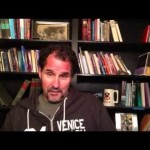We run our website the way we wished the whole internet worked: we provide high quality original content with no ads. We are funded solely by your direct support. Please consider supporting this project.

Changing Beliefs
Stephen Mattson is a follower of ReKnew and a member of Woodland Hills Church who posted a piece on Sojourners titled Christians: It’s NOT a Sin to Change Your Beliefs. He points out that doubt and questions are a natural and needed part of any Christian’s life, and our community needs to change the ways we respond to one another when these things surface. Check it out!
From Stephen’s article:
Theoretically, Christians can go from preschool to seminary hearing the exact same religious doctrines. Theologies are often considered too “valuable,” “right,” and “holy” to change or question. Therefore, pastors debate instead of dialogue, professors preach instead of listen, schools propagate instead of discuss, and faith-based communities ultimately reject any form of honest questioning and doubt.
Indoctrination is preferred over critical thinking, certainty is favored over doubt, and we expect our leaders to offer black-and-white answers. A change of theology is viewed as weakness, poor exegesis, and a sign of insecurity. “If they change their views now, how can I believe anything they say in the future?” Christians often perceive change as a break in trust and a loss of identity.
Category: General
Tags: Belief, Change, Curiosity, Doubt, Faith, Mercy, Q&A, Sojourners, Stephen Mattson
Related Reading

Christ the Center
The center of the Christian faith is not anything we believe; it’s the person of Jesus Christ. The foundation of my faith is a person, not a book and a set of beliefs about that book. Rather than believing in Jesus because I believe the Bible to be the inspired Word of God, I came…

What is the biblical basis for “free will”?
Question: Much of your theology depends on a supposed ability humans have to thwart God’s will by our free choices. But what is the biblical basis for your conclusion that people have “freedom”—at least “freedom” in the sense that we can decide to go along with or thwart God’s will for our lives? Answer: Scripture…

How do you respond to Proverbs 16:4?
“The Lord has made everything for its purpose, even the wicked for the day of trouble.” Calvinists often cite this verse to support the conclusion that some people are created wicked for the expressed purpose of being sent to hell. Since Scripture teaches that God is love (1 John 4:8, 16), that God loves all…

Quotes to Chew On: Doubt
Gisela Giardino via Compfight Marcus Goodyear wrote an article back in 2011 reflecting on Mother Teresa’s experience of doubt. Many now know that although Mother Teresa worked tirelessly in the slums of Calcutta, she struggled with doubt and spiritual isolation most of her life. Marcus finds this comforting in some way, and he relates to…

Video Q&A: Do you think Jehovah’s Witnesses and Mormons are saved?
Does Greg believe that everyone goes to Heaven regardless of their beliefs? Find out here.

